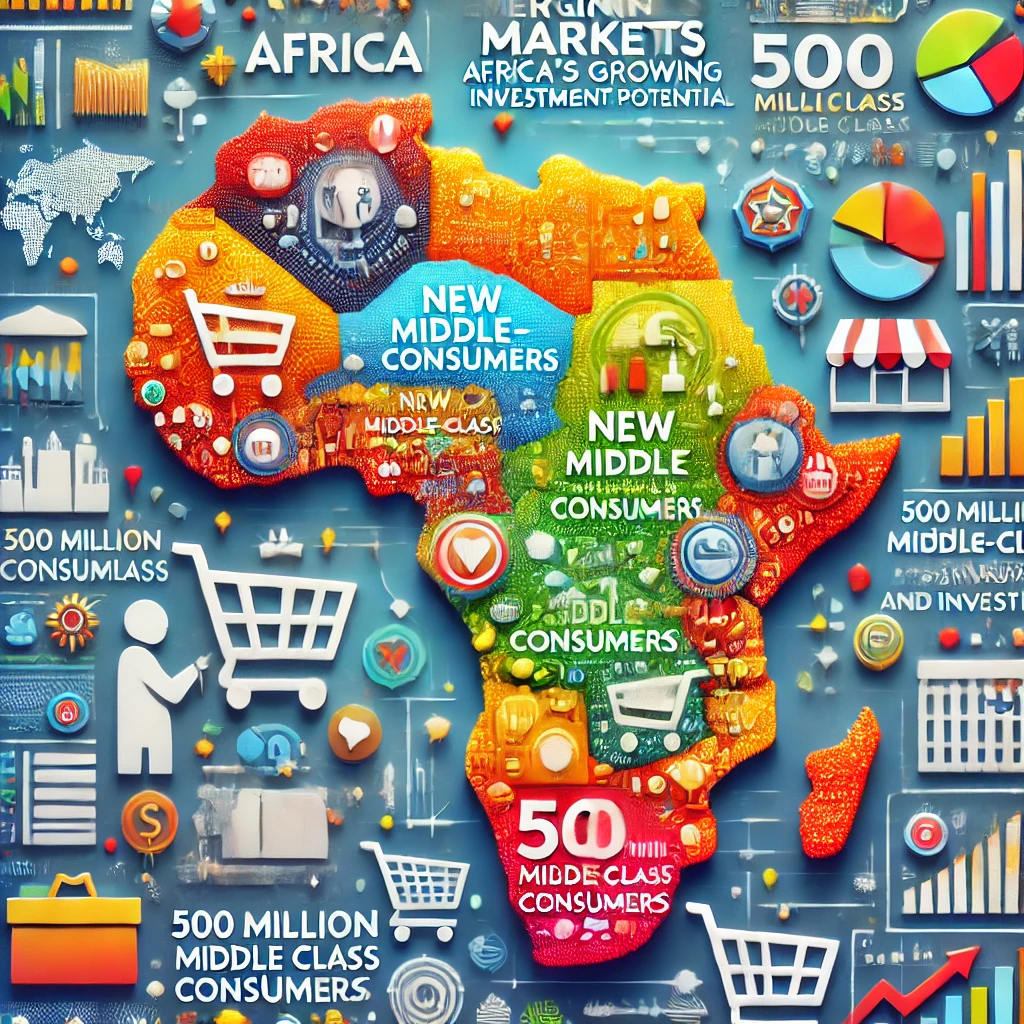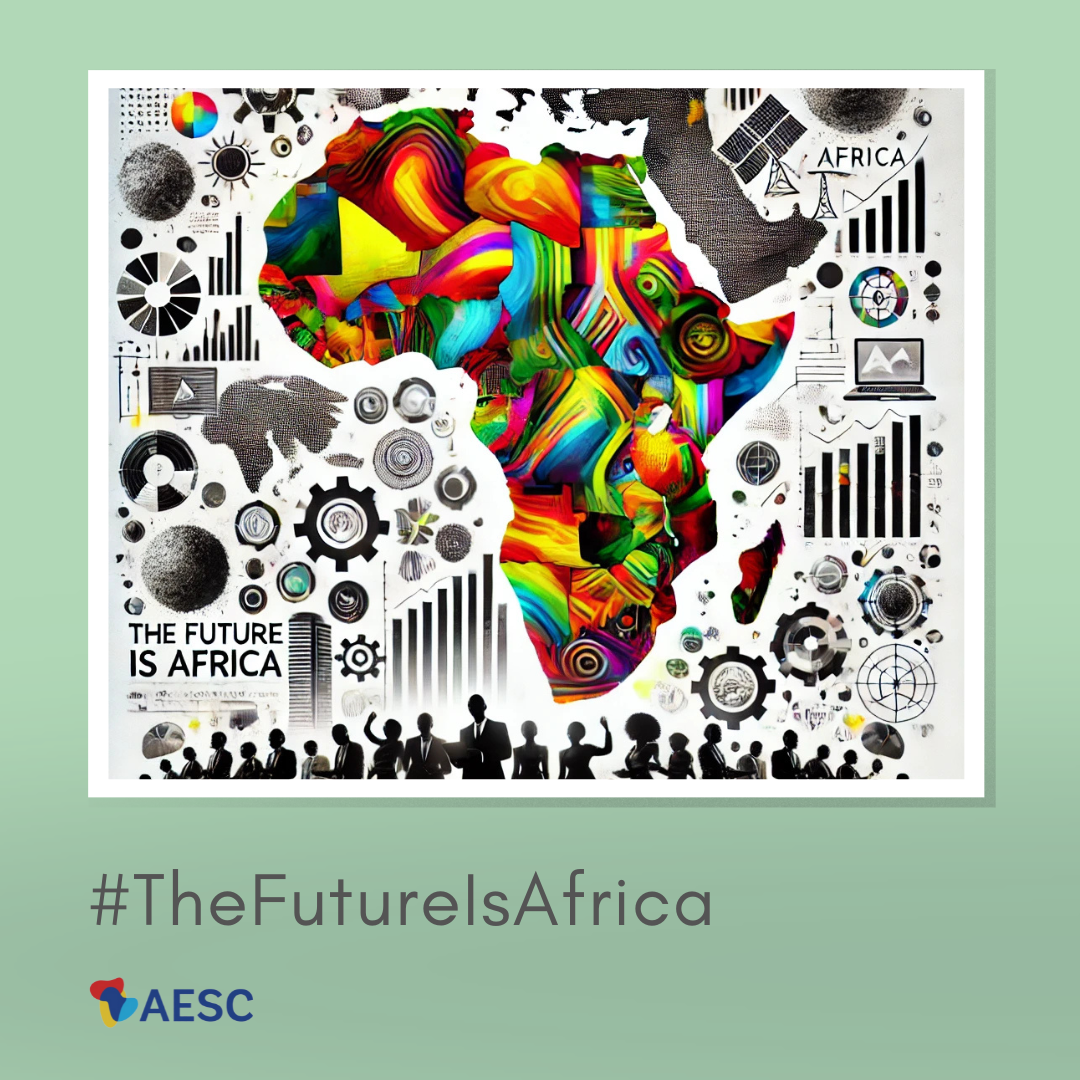
Emerging Markets: Africa’s Rising Middle Class and Investment Potential
As the global economy continues to evolve, Africa’s emerging markets are increasingly capturing the attention of investors, multinational corporations, and governments alike. The continent is home to some of the world’s most promising emerging markets, with 500 million new middle-class consumers projected to rise in the coming decades. This growing middle class, alongside the continent’s expanding urban centres and young population, is set to transform Africa into a critical hub for economic activity, innovation, and investment. The rapid expansion of these markets, characterized by high growth potential and untapped opportunities, makes Africa one of the most attractive regions for both domestic and international investors. This trend, driven by economic diversification, increased spending power, and improving business environments, underscores why the future is intricately linked to Africa’s development as a global economic powerhouse.
1. The Rise of Africa’s Middle Class: Economic Transformation and Opportunity
One of the most significant indicators of Africa’s economic transformation is the emergence of a substantial middle class. Currently estimated at around 500 million people, this middle class is expected to grow substantially as economic growth continues and urbanization accelerates. This demographic shift not only reflects rising incomes but also signals a transformative change in consumption patterns, economic activity, and overall development. As incomes increase, this burgeoning middle class is driving demand for a wide range of goods and services, from housing and education to technology and healthcare, thus creating vast opportunities for businesses.
In countries such as Nigeria, Kenya, Egypt, and South Africa, the middle class has become a major economic force, driving the expansion of sectors such as retail, telecommunications, finance, and real estate. For example, Nigeria’s retail sector has witnessed significant growth as more consumers demand modern retail experiences, including shopping malls and e-commerce platforms. Similarly, the telecommunications industry across the continent has thrived as mobile technology becomes a staple in middle-class households, not just for communication but also for accessing banking services, education, and entertainment.
The rise of the African middle class has also led to increased investment in real estate and infrastructure development. Major cities like Lagos, Nairobi, and Accra are experiencing real estate booms, with new residential, commercial, and mixed-use developments catering to the growing demand for urban living spaces. This trend reflects the continent’s rapid urbanization, as millions of Africans move to cities in search of better economic opportunities and improved living standards. As these urban centres expand, they create a ripple effect, stimulating the construction industry and supporting a range of auxiliary businesses, thereby further boosting economic growth.
2. High Growth Potential: Africa’s Economic Diversification
Many African countries, classified as emerging markets, have shown impressive economic growth rates in recent years, with some economies consistently posting growth rates above the global average. Nations such as Ethiopia, Ghana, Rwanda, and Côte d’Ivoire have emerged as growth leaders, driven by a combination of prudent economic policies, investment in infrastructure, and diversification into new industries. This economic momentum is expected to continue as these countries leverage their strengths in agriculture, manufacturing, services, and technology to build resilient and diversified economies.
For instance, Ethiopia has become a hub for light manufacturing, particularly in the textile and apparel industry, attracting significant foreign investment and creating thousands of jobs. Rwanda, known for its stable political environment and progressive business policies, has positioned itself as a regional leader in technology and innovation. Through initiatives like Kigali’s innovation hubs, Rwanda is not only nurturing local talent but also attracting international tech firms eager to tap into Africa’s growing digital economy.
Agriculture remains another key driver of growth for many emerging markets in Africa. With 60% of the world’s remaining arable land, the continent is ripe for agricultural expansion and modernization. Countries like Ghana and Kenya are investing in agro-industrial complexes to add value to raw agricultural products, ensuring that they move beyond export dependency and create higher-value products for both domestic and international markets. This transformation is supported by technological advancements, such as digital platforms that connect farmers to markets and provide data for improved crop management.
These developments highlight Africa’s potential to diversify its economies beyond reliance on raw materials and commodities. By investing in value-added industries and modernizing traditional sectors, African countries are creating new engines of growth that increase their resilience to global economic fluctuations. This high growth potential, coupled with an expanding consumer base, makes Africa’s emerging markets a focal point for international investment.
3. Attractiveness to Investors: Favorable Demographics and Expanding Markets
The attractiveness of Africa’s emerging markets extends beyond economic growth rates. The continent’s demographics present a unique opportunity for long-term investment. With a population projected to reach 2.5 billion by 2050, half of whom will be under the age of 25, Africa offers a young and dynamic labour force that is essential for sustainable economic development. This youthful population is not only a source of labour but also a powerful consumer base that will drive demand for goods and services over the coming decades.
Investors are increasingly aware of the opportunities that come with Africa’s demographic dividend. The African Continental Free Trade Area (AfCFTA), one of the most ambitious economic integration projects globally, is creating a unified market of over 1.3 billion people. By eliminating tariffs and non-tariff barriers across African countries, the AfCFTA aims to stimulate intra-African trade and create a more cohesive and competitive economic bloc. This initiative provides an immense opportunity for investors looking to tap into new markets and benefit from economies of scale.
Moreover, the digital revolution sweeping across Africa is transforming the business landscape, making it more attractive for investment. Mobile banking and fintech have revolutionized the financial sector, providing access to millions of unbanked consumers and expanding the reach of financial services. Companies like M-Pesa in Kenya and Flutterwave in Nigeria exemplify how technology-driven businesses are scaling rapidly and attracting significant capital. The rise of e-commerce platforms like Jumia further demonstrates the vast potential of Africa’s digital economy, as these platforms connect consumers to a wider array of goods and services than ever before.
The presence of investment-friendly policies is another critical factor that enhances Africa’s appeal to investors. Countries like Ghana, Rwanda, and Morocco have implemented reforms to improve their ease of doing business, reduce bureaucratic hurdles, and create more transparent regulatory frameworks. These efforts, combined with incentives such as tax breaks and special economic zones, have drawn in multinational companies eager to establish operations in Africa’s growing markets.
4. Challenges and Strategic Opportunities for Investors
While Africa’s emerging markets present immense potential, there are also challenges that need to be managed to ensure sustainable growth. Infrastructure deficits, regulatory unpredictability, and political instability in certain regions can pose risks to investors. However, these challenges also present opportunities for strategic investment, particularly in sectors such as infrastructure development, energy, and technology.
Infrastructure development is one area where Africa’s growth potential is significant. With increased foreign direct investment (FDI), Africa’s infrastructure landscape is rapidly changing. Major projects, such as the Lagos-Ibadan railway in Nigeria and the Nairobi Expressway in Kenya, demonstrate the scale of development and the role of international partners like China’s Belt and Road Initiative (BRI). Investing in infrastructure not only addresses logistical challenges but also supports the broader economic ecosystem, enabling smoother and more efficient business operations.
Similarly, Africa’s energy sector offers vast investment opportunities. As the continent seeks to meet the demands of its growing population and emerging industries, investments in renewable energy sources like solar, wind, and hydropower are becoming increasingly attractive. Countries like Morocco and Egypt have launched large-scale solar projects that not only provide clean energy but also create new business opportunities and promote sustainable development.
Conclusion
Africa’s emerging markets are rapidly transforming into economic powerhouses driven by a rising middle class, expanding consumer markets, and high growth potential. The continent’s demographic advantages, improved business environments, and ongoing efforts towards economic diversification make it an attractive destination for investors. While challenges remain, they are increasingly being met with strategic solutions, creating even more opportunities for growth and development. With 500 million new middle-class consumers poised to enter the market, Africa’s future as a global economic hub is bright, reinforcing why the world’s gaze is fixed on its evolving markets.



